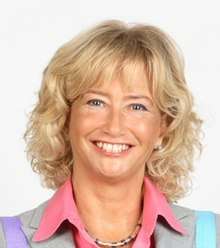Helen Doron
Helen Doron (born 5 November 1955) is a British linguist and educator who lives in Israel. She is the founder of the Helen Doron Educational Group which offer English classes to young people.[1] The various Helen Doron learning centres are linked to each other through a franchise network which is based in Misgav.[2] She lives in Hararit.[3]
Helen Doron | |
|---|---|
 | |
| Born | 5 November 1955 London, UK |
| Nationality | British |
| Education | University of Reading Linguistics |
| Occupation | Linguist and educator |
| Known for | Founder of the Helen Doron method of education |
| Children | Three |
Biography
Doron grew up in London.[3] She studied linguistics and the French language at the University of Reading.[3] She taught at the University of Poitiers in France before completing her MA in Linguistics. After a few years she developed her own methodology, known as the Helen Doron method.[4] The Doron method teaches English, often using music.[5] There is also listening, watching teacher's body language and gestures and student repetition involved in the method.[6] In a study published in Procedia - Social and Behavioral Sciences, the authors found that the Helen Doron Early English courses were "one of the most famous and successful courses in teaching English as a second language to pre-school children in the Czech Republic."[7] The Doron learning process was also studied in Poland, with several young English learners.[8]
Helen Doron began teaching in 1985, using cassette tapes she made herself with songs, poems and stories in English.[3] In 1990, the first learning centre was opened. The first franchise opened in Austria in 1997.[3] In 2000, approximately 15,000 children in Israel took part in Helen Doron classes from the franchise.[9] In 2002, in Germany and Poland, there were 8,000 children involved and in Hong Kong, Indonesia and South Korea.[3] Other locations include Spain and several planned areas in Latin America.[10]
References
- Brinn, David (6 January 2013). "Ella Climbs the Artistic Peak". The Jerusalem Post. Archived from the original on 20 February 2016. Retrieved 19 January 2016 – via HighBeam Research.
- "English exported to Turkey". Israel Business Today. 4 June 1993. Archived from the original on 20 February 2016. Retrieved 19 January 2016 – via Highbeam Research.
- Hoffmann, G.K. (13 December 2002). "The Business of English". The Jerusalem Post. Archived from the original on 5 May 2016. Retrieved 19 January 2016 – via HighBeam Research.
- Doron, Helen (1 September 1993). "Teaching English to Infants and Primary Schoolchildren in Israel‐‐A Special Project". Educational Media International. 30 (3): 119–123. doi:10.1080/0952398930300302. ISSN 0952-3987.
- Zohar, Gil (11 March 2006). "Accent on Tolerance". Toronto Star. Retrieved 19 January 2016 – via EBSCO.
- Jakubowski, Marek; Gryniewicz-Jaworska, Michalina (2013). "The Concept of Advisory for Parents Looking for a Language School for Their Baby". Advances in Science and Technology – Research Journal. 7 (20): 94–99. doi:10.5604/20804075.1073080.
- Klimova, Blanka Frydrychova (21 October 2013). "Teaching English to Pre-school Children". Procedia – Social and Behavioral Sciences. 3rd World Conference on Learning, Teaching and Educational Leadership. 93: 503–507. doi:10.1016/j.sbspro.2013.09.228.
- Scheffler, Paweł (1 March 2015). "Introducing very young children to English as a foreign language". International Journal of Applied Linguistics. 25 (1): 1–22. doi:10.1111/ijal.12035. ISSN 1473-4192.
- Shaviv, Miriam; Solomon, Gur (17 November 2000). "Is Hebrew Over the Hill?". The Jerusalem Post. Archived from the original on 20 February 2016. Retrieved 19 January 2016 – via HighBeam Research.
- "Helen Doron English abrirá nuevos centros en Latinoamérica y Europa en 2016". TeleCinco (in Spanish). 29 December 2015. Retrieved 19 January 2016.